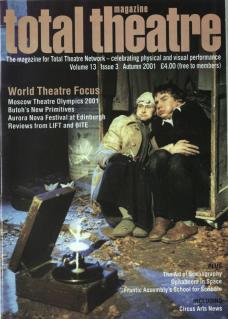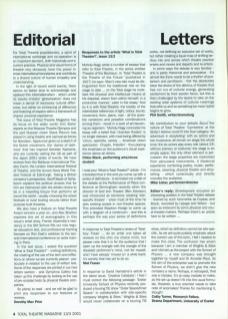For Total Theatre practitioners, a spirit of international exchange and cooperation is an important element, both historically and in current practice. Physical and visual forms of theatre very obviously have the power to cross international boundaries and contribute to a shared culture of human empathy and understanding,
In the light of recent world events, there seems no better time to acknowledge and applaud this internationalism – which unlike its tawdry imitator 'globalisation’ does not mean a denial of necessary cultural difference, but rather an embracing of difference and fostering of respect within a framework of shared universal experience.
This issue of Total Theatre Magazine has its focus on the wider world: Emi Slater reports on the Moscow Theatre Olympics and the part Russian clown Slava Polunin has played in using theatre and carnival as forces for liberation. Ajaykumar gives us a sketch of the Butoh movement, the 'dance of darkness' that has inspired Gekidan Kaitasha, who are currently visiting the UK as part of the Japan 2001 series of events. We have reviews from the Barbican International Theatre Event, the London International Festival of Theatre, and the Aurora Nova World Theatre Festival at Edinburgh. Taking a British company's perspective, Geoff Beale of Ophaboom explains the political choices that for him are interwoven with the artistic choice to be in a travelling troupe that performs all round the world – usually choosing the street festivals or rural touring circuits rather than purpose-built theatres.
We also have a feature on Total Theatre Award winners a year on, and Alex Shelton explores the art of scenography in this issue's artist diary. Frantic Assembly's residency at the Brit School fills our now regular education slot, and professional training focuses on Ron East's address to the second international conference on actor training in Paris.
In the last issue, I asked the question ‘What is Total Theatre?’ – inviting definitions, the charting of the use of the term and reflections on where we are currently placed – particularly in relation to the use of written text. Some of the responses are printed in our new letters section and Dymphna Callery has taken up the challenge by looking at the use of pre-scripted texts by physical theatre companies.
So plenty to read – and we will be glad to print any responses to our features or reviews.

